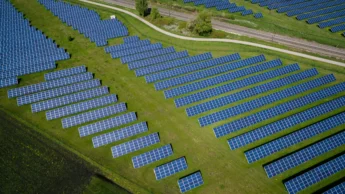In a world where the calls for sustainability and environmental awareness are getting louder, the use of renewable energy sources is central to the fight against climate change. While individual efforts by citizens and businesses play an important role, a crucial responsibility rests on governments worldwide to accelerate the transition to renewable energy. With the urgency of the climate crisis in mind, it is vital that governments actively pursue policies to encourage and promote the use of renewable energy.
In this blog, we explore the role governments can play in encouraging renewable energy initiatives and the impact these measures can have on creating a greener and more resilient future for our planet.
Do you want your innovation to make it easier to meet ESG targets? Would you like to develop your idea in collaboration with Beeliners? We would love to help you! Feel free to drop by for a cup of coffee and we will be happy to discuss the possibilities with you.
The role of governments
Governments play a crucial role in encouraging renewable energy initiatives through various policy instruments and incentives. These include subsidies and tax breaks for renewable energy projects, implementing regulations that promote the transition to sustainable energy, such as mandatory renewable energy use targets and fossil fuel emission reductions, and facilitating investment in infrastructure for sustainable energy generation and distribution.
Moreover, through information campaigns and educational programmes, governments can raise awareness about the benefits of renewable energy and the need for a green transition, thereby not only stimulating demand for renewable energy but also increasing support for it within society.

Impact measures
The impact of governments’ measures to encourage renewable energy initiatives is significant and wide-ranging. First, these measures encourage investment in the development and implementation of renewable energy technologies, leading to greater diversification of energy supply and reduced dependence on fossil fuels. This contributes to a more resilient and stable energy system, less susceptible to price fluctuations and geopolitical tensions. Moreover, these measures boost the green economy by creating jobs in the renewable energy sector and promoting innovation and technological progress.
In the long term, governments’ efforts to promote renewable energy help reduce greenhouse gas emissions and combat climate change, creating a healthier and more sustainable living environment for current and future generations.
Renewable energy for businesses
Governments can encourage the use of renewable energy for businesses in various ways. One of the most effective methods is offering financial incentives, such as grants, tax breaks or loans with favourable terms for companies investing in renewable energy solutions. These financial incentives help lower the initial cost of investments in, for example, solar panels, wind turbines or energy-efficient equipment, making companies more likely to switch to renewable energy.
In addition, governments can implement regulations that promote sustainability, such as mandatory targets for the use of renewable energy or emission limits for industrial sectors. By setting clear guidelines and targets, governments create an enabling environment that encourages companies to invest in renewable energy and reduce their carbon footprint.
Furthermore, governments can also invest in the research and development of new renewable energy technologies, reducing their costs and improving their efficiency. This not only gives companies access to innovative solutions, but also stimulates the growth of the renewable energy industry as a whole, creating new economic opportunities and fostering competition.
Educational programmes and information campaigns also play an important role in making companies aware of the benefits of renewable energy and the importance of a green transition. Through workshops, seminars and information resources, governments can help companies make informed decisions about their energy use and encourage them to integrate sustainability into their business strategies.
Renewable energy for individuals
As with businesses, governments encourage the use of renewable energy for individuals in various ways to accelerate the transition to a greener energy supply. One key way this is done is by offering financial incentives such as subsidies, tax breaks or loans with favourable terms for installing renewable energy solutions such as solar panels, heat pumps and wind turbines. These financial incentives help individuals reduce initial investment costs and make renewable energy solutions more attractive and accessible to homeowners.
In addition, governments can implement regulations that promote sustainability, such as building codes requiring the use of sustainable building materials and energy-efficient designs, or regulations requiring the installation of solar panels on new buildings. By introducing such regulations, governments can stimulate demand for renewable energy and facilitate its integration into the daily lives of individuals.
Furthermore, governments can organise educational programmes and information campaigns to make individuals aware of the benefits of renewable energy and inform them about available options and technologies. By providing information and resources, governments can help individuals make informed decisions about using renewable energy in their households and raise awareness about the urgency of reducing dependence on fossil fuels.
Governments can also invest in developing renewable energy infrastructure, such as electric vehicle charging stations, encouraging individuals to switch to cleaner modes of transport and further reduce their carbon footprint. Through these and other measures, governments can encourage the use of renewable energy for individuals and contribute to a more sustainable and resilient society.
Working on your ESG-innovation together with Beeliners
Do you have a good idea for a product, service, process or technological innovation that makes it easier to achieve ESG goals? And would you like to develop your idea in collaboration with Beeliners? Beeliners has an innovation cell dedicated to innovations in energy and heating systems. Feel free to drop by for a cup of coffee and we will be happy to discuss the possibilities with you.
Also interesting
-

How will the production of green gas be encouraged?
In an era when the world is paying increasing attention to renewable energy sources, green gas is a promising alternative that has the potential to reduce our dependence on fossil fuels. Green gas, also known as biomethane, is produced from organic material such as green waste, sewage sludge, or even… Read More
-

What is bio-energy?
In an era when the urgency of renewable energy sources is becoming increasingly prominent, bioenergy takes centre stage as a promising and environmentally friendly solution. This renewable form of energy, derived from biological sources such as plants, offers a range of possibilities for reducing our dependence on fossil fuels and… Read More
-

Using more renewable energy, 7 innovations
The energy transition is in full swing. We are switching to renewable energy sources, such as solar and wind, to keep our planet livable. But how do we make this switch smoothly and efficiently? The key lies in innovation. In this blog, we discuss various innovations that make renewable energy… Read More

